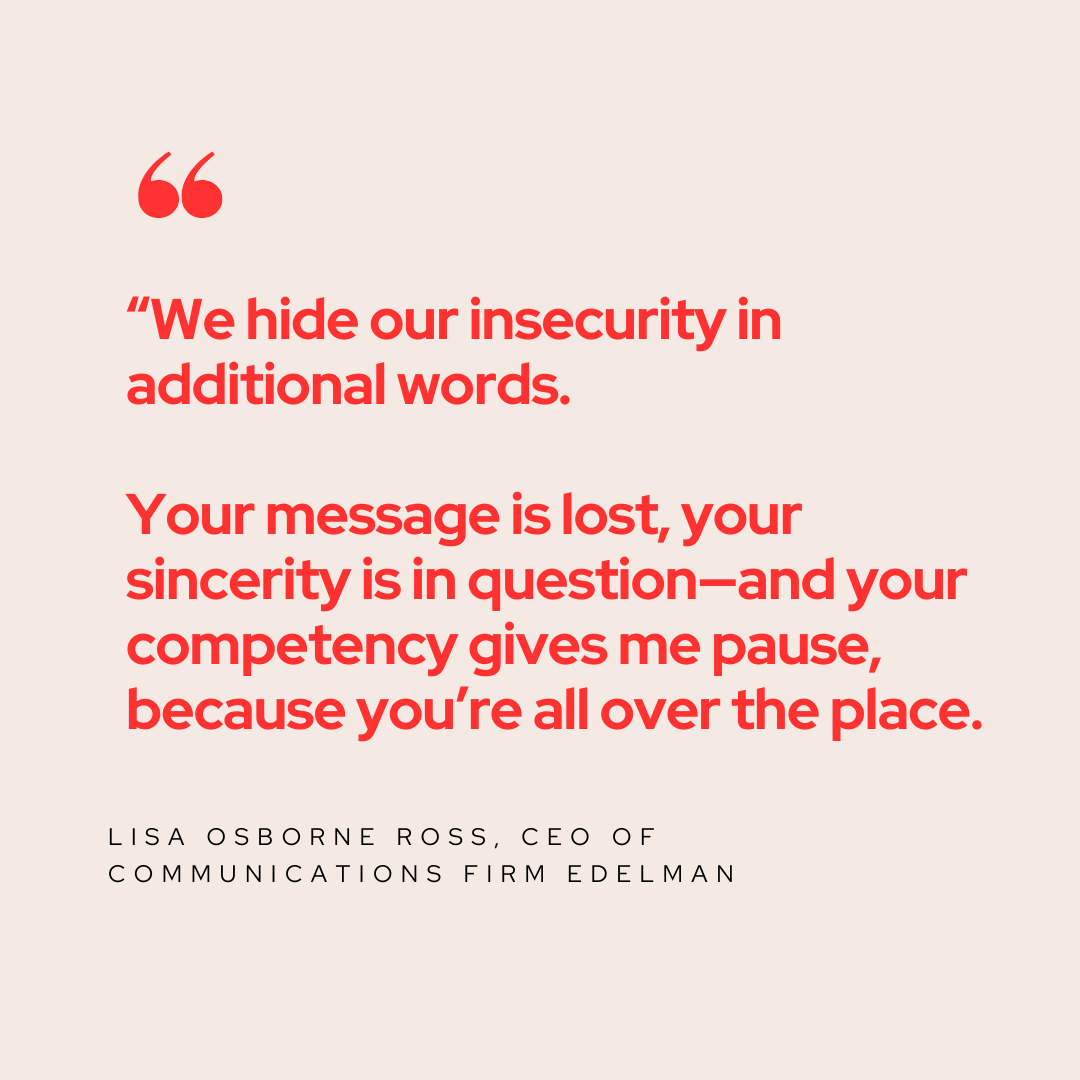Become A Master Storyteller in 7 Sentences
Creating your own content is like flying too close to the sun.
You’re so immersed in the message it’s hard to say it simply.
When we’re talking to someone in person, we instinctively know not to:
Use fancy words
Explain the obvious
Tell people things they already know
Yet, when we write online, we do all three in opposite of our intuition.
Expertise is hidden behind extra words, long explanations, and irrelevant background info.
It’s not our fault. We were taught in school that length = authority.
But on the internet it costs credibility.
Straightforwardness is a hallmark of expertise. People trust people who can:
Explain a complex topic accurately, specifically, and concisely.
Turn an obvious or well-known piece of information into an ‘aha’ moment. (See how)
Takeaway: Respect the reader's time, and they’ll repay you with their trust and attention.
Like the book Smart Brevity says —it isn’t about saying less, it’s about saying more with fewer words.
How?Here are three ways to communicate your expertise through trustworthy content, plus a 7-sentence storytelling framework you can use for carousels, captions, and threads.
Pick One Thing
You can cut a lot of words without sacrificing substance by thinking less about what you want to say and more about what others need to hear to get it.
—What’s the one thing people need to understand?
—How does that understanding make them feel?
Working backwards from the big point while keeping the emotional impact top-of-mind saves you time writing and cuts down on extra words, irrelevant background info, and overexplaining.
Make it easier — When I overwrite, it’s usually because two big ideas are competing for the spotlight.
I’ll stay on point by breaking the lengthy writing into two posts. Win-win.
2. Blocks of Texts are Eye Repellant
Do you remember learning how to read? Dragging your finger underneath each sentence to catch every word.
The way we read online is different from the way we were taught. Most people only read the first six words, and skim the rest (if we’re lucky!)
Good news: We don’t need people to read a lot for them to understand us. The trick is in the presentation.
Instead of saying —
“Content creation is overwhelming. There are only so many hours in a day. We’re trying to be the best we can for our clients, family, and followers, but it’s a lot. We need a better way to manage stress by making coming up with content ideas easier. I like to get inspired by what inspires me when I’m reading, watching, or listening to something I love. Another thing I do is find inspiration in my old posts. There’s usually some line that can inspire a whole new concept I could write about when I’m short on time."
Bullet points get the point across. Say —
“‘Find content ideas’ doesn’t deserve a special spot in your calendar.
Read
Listen to podcasts
Find nuggets in old posts that can be expand on
Get inspired by what’s inspiring you and never stress about finding ideas.”
Number the points if they must be listed in order of importance. Otherwise, list each point in order of sentence length — it draws the eye in. See examples all over this article.
3. Dismantle Your Posts
Specificity is a hallmark of expertise.
Pull apart round up style posts. They have headlines like:
“3 Ways To Y”
“7 Signs You're Z”
“10 Things I Did To Achieve X”
Instead —
Laser-focused on one of those tips.
Ask, “What’s the one thing people need to understand?”
Include a real-life example or story to illustrate the main point.
More on how to create better content when you repurpose here.
Storytelling Content Prompt
My journalism professor let out an audible yawn if our stories bored him.
He did this because when our storytelling dragged on. Too much context is the number one killer of content — stories included.
People spend too much time on the set up.
Unlike my professor, people won’t tell you your story is boring. They’ll just get back to their regularly scheduled scrolling.
Hold their attention with this simple seven sentence story structure.
Become A Master Storyteller in 7 Sentences
One sentence for context. (Who, what, where)
“In January, my highest paying client ghosted me.”
Two sentences to introduce the problem (Why should readers care)
“By February, I knew late invoices would go unpaid. The business wouldn’t survive the winter if I didn’t find better clients — fast.”
Two sentence response. (What did you realize to solve the problem?)
“Then I remembered nothing encourages people more than a recommendation from a friend. I didn’t need to find new people, I needed to ask previous clients for referrals.”
One sentence result. (How did it work out?)
“ I reached out to former clients, and before I knew my calendar was filled with quality leads.
One sentence lesson. (The takeaway)
“Replace lack with resourcefulness.”
Become A Storyteller
I saw a post last week that asked if great writers were born or made. The author implied that you either got it or you don’t.
Intellectual elitism is wack.
Anyone can be a better writer or storyteller with practice — just like I learned from my professor and continue to learn through books like Smart Brevity.
Sometimes the words don't come out as eloquently as we thought them in our heads.
We have to acknowledge the words didn’t land, and question how it can be improved upon.
Iteration is an underrated skill.
This is not to be confused with overthinking whether it’s good enough. It’s about the practice of getting better at expressing your ideas.
It’s about taking a beat to refine the message that’s always on the tip of your tongue but never quite translates to the page.
I hope these copywriting tips can help you say it louder.
Happy Storytelling!
Cyndi
StoryCraft Marketing
These storytelling prompts were originally published in the StoryCraft Newsletter, where solopreneurs learn how to share their story through content.


